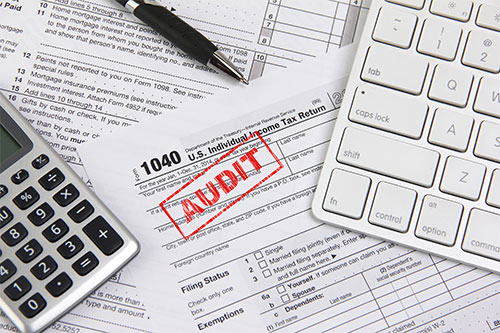10 Small Business Mistakes that Can Trigger an Audit
When you think about taxes every year, usually it is not a pleasant process. But, not thinking about how to be as certain as possible that you are doing things right to avoid scrutiny by the IRS can bring real troubles.
- Document business use of vehicles properly.
This applies both to personal vehicles used partially for business and to vehicles purchased and used exclusively in the business. Both are areas where the IRS computers scrutinize your numbers, and then they may get more scrutiny by people if the computers kick them out as out of the norm.
When you buy or lease vehicles solely for business use, keep that word “solely” in mind. Do not be loaning them out to friends or family when they have repairs and need a loaner. Be able to prove that they are used solely for business purposes. For personal vehicles split between personal and business use, be incredibly careful to determine an accurate percentage of use that is business if you are deducting actual costs.
- Unusual sums given to charities.
What would be considered an unusual sum for charitable gifts by a business? There is no set number, but sudden large charitable contributions that are out of the norm for a business could flag your return for audit. Charitable contributions should be reasonable and not a huge percentage of earnings in any given year. Regular reasonable annual contributions are better.
- Year-over-year net losses.
The general rule is that the IRS could flag your return for audit and possibly categorize your business as a hobby if you have more than two loss years out of five. Sole proprietorships are particularly vulnerable to IRS scrutiny if they report losses. This is because the IRS expects to find comingling of funds or expenses between personal and business.
- Too many or too large cash transactions.
The IRS simply does not like cash transactions, particularly a large number of them for a small business, especially sole proprietorships. They just assume that you are either going to forget to report some income or worse, you will intentionally avoid reporting cash receipts as income.
- Abnormally high salaries.
Because there are tax advantages available to business owners that can vary based on business income and salaries paid to key personnel and owners, you must be careful to not take an abnormally high salary or pay others salaries that are out of line with similar work performed in other businesses.
- Errors in math and rounding off numbers.
When it comes to taxes and their forms, the IRS wants deadly accuracy. Rounding off numbers can work in many areas of business, but not for taxes. Rounding numbers leads to calculation errors. Avoid calculation errors in any work with numbers for taxes. Double or even triple check your math.
- Failure to report taxable income.
This is a major area of concern and scrutiny. Do not assume that you can fail to report income if a client or customer does not send you the required Form 1099. You keep up with your accounting and report all income for taxes.
- Rental income loss reporting.
The IRS strictly limits the conditions under which a loss can be reported from rental income. Even if you think that you see a legitimate reason for a loss from rental operations, consult with an experienced accountant to determine deductibility.
- Adopting digital currency.
While it may be the hot topic at business gatherings, the governments around the world and the IRS are working hard to understand the many digital currency offerings and how they could shield taxable income from their scrutiny. Do not jump on the digital bandwagon for your business currency exchanges until more is known.
- Too many deductions.
It can be tempting to deduct every little expense you incur during your business operations and even some personal life situations. The IRS scrutinizes sole proprietors even more than other business entities because they can have a tendency to mix business and pleasure for expense deductions.
There you have a top 10 list for mistakes that can get you audited. There are others but consult with your accountant when you have questions.

